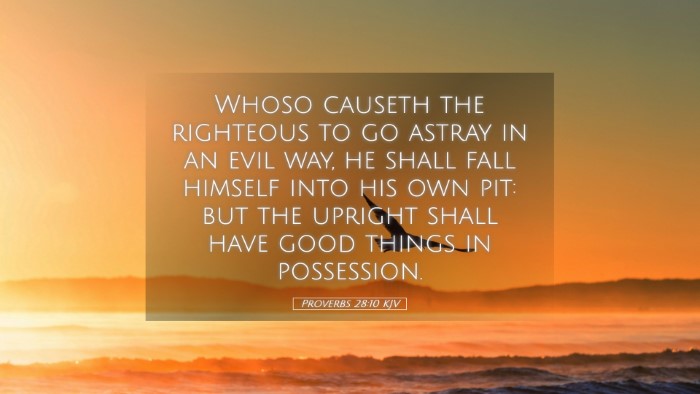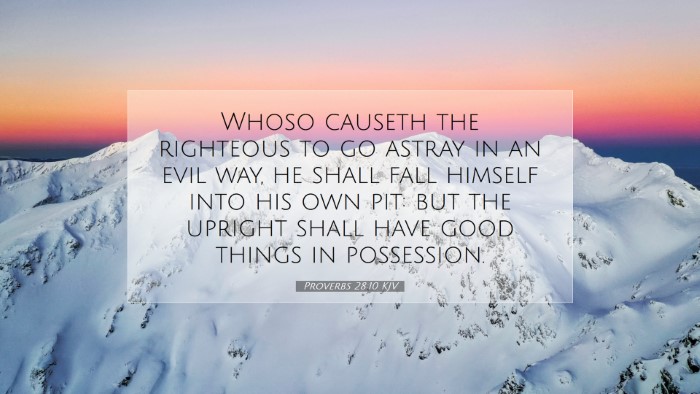Commentary on Proverbs 28:10
Verse: "Whoso causeth the righteous to go astray in an evil way, he shall fall himself into his own pit: but the upright shall have good things in possession."
Introduction
The book of Proverbs is a rich tapestry of wisdom literature, offering insights into the moral order of the world. Proverbs 28:10 stands out as a sobering reminder of the consequences of leading others astray, especially the righteous. This commentary will engage with the observations of notable public domain scholars to elucidate this verse for pastors, students, theologians, and Bible scholars.
Analysis of the Verse
The verse can be divided into two distinct yet related parts that reflect the fate of the unrighteous and the blessings of the righteous.
Part 1: The Fate of the Deceiver
“Whoso causeth the righteous to go astray in an evil way, he shall fall himself into his own pit.”
- Matthew Henry: Henry asserts that the person who leads the righteous astray is marked by treachery and deceit. Their actions are rooted in a desire to manipulate the faithful, often out of jealousy or wickedness. Henry warns that such duplicitous behavior not only harms the righteous but ultimately leads to self-destruction.
- Albert Barnes: Barnes emphasizes that the “pit” represents the schemes and traps that the wicked lay for others. These traps, ironically, ensnare the one who has set them. Barnes interprets this as a natural consequence of moral law—what a person sows, they shall also reap.
- Adam Clarke: Clarke elaborates that leading others into sin is akin to digging one's grave. He notes that the 'pit' is a metaphor for the ruin that awaits those who oppose the ways of righteousness. Clarke connects this to the broader theme of divine justice, suggesting that God sees the actions of the wicked and holds them accountable.
Part 2: The Reward of the Righteous
“But the upright shall have good things in possession.”
- Matthew Henry: In contrast to the fate of the wicked, Henry notes that the “upright” represents those who adhere to integrity and truth. The 'good things' may refer to both spiritual and material blessings. Henry underlines that the assurance of these rewards comes from God's promise to uphold righteousness.
- Albert Barnes: Barnes elucidates that the blessings mentioned are not always tangible possessions but can include peace, joy, wisdom, and a deep sense of fulfillment. He suggests that the 'good things' are a direct result of living in accordance with God’s laws and moral code.
- Adam Clarke: Clarke argues that the upright will ultimately possess not only material benefits but also eternal values that come from living a life aligned with divine purpose. The good things referred to in this verse convey the idea of a life that is enriched by virtue and aligned with God's will.
Theological Implications
This verse encapsulates the contrast between righteousness and wickedness, a central theme in biblical literature. The notion that leading others astray leads to one’s downfall raises significant ethical considerations for leaders and influencers within the church and society.
- Leadership Responsibility: Pastors and teachers must heed the warning that their influence can have profound implications. The righteous must lead by example, guiding others towards truth rather than deception.
- Divine Justice: This verse serves as a comforting reminder of God’s justice. Although the wicked may seem to prosper temporarily, their ultimate fate is destruction, while the rewards of the righteous are assured.
Practical Applications
For modern believers and leaders, Proverbs 28:10 serves as a guide for ethical conduct and integrity:
- Self-Examination: Individuals are encouraged to examine their own actions and intentions. Are they leading others towards righteousness or are they causing them to stumble?
- Encouragement in Righteousness: Righteous individuals should be encouraged to support and uplift one another, recognizing that each person's walk of faith affects the broader community.
- Awareness of Consequences: Understanding that actions have consequences can deter individuals from deceitful practices, knowing that such behavior ultimately leads to downfall.
Conclusion
Proverbs 28:10 is a poignant reminder of the moral fabric that governs human interactions. The insights from Matthew Henry, Albert Barnes, and Adam Clarke reveal the depth of wisdom encapsulated in this verse. For the righteous, there is the promise of blessing, while the wicked face the inevitable consequences of their actions. As we reflect on this passage, may we strive to embody righteousness in our lives and lead others toward the path of truth.


